If you are a part of the consulting industry, chances that you haven’t experienced a case interview are pretty slim. Nowadays, this unique interview process is becoming more popular among other professions.
That’s exactly why everyone should know what it is and how to handle it.
Let’s start from the beginning!
What Is a Case Interview?

Case interviews are the core of the selection process right across McKinsey, Bain, BCG, the consulting wings of the Big Four and any other high-end consultancies.
To get a job at any of these companies, it’s imperative to ace their case interviews.
This specific type of interview could be defined as a hypothetical business situation that is presented to a candidate during the interview process.
The goal is to learn how a candidate thinks about a certain business problem and how they would solve it. In most cases, the problem a candidate is presented with is a former problem that the interviewer had previously faced.
It’s basically designed to simulate the life that consultants have. It replicates, everything a consultant is going through. The difficult part is that you need to show all the engagement in thirty minutes. This is how long the interview usually lasts.
When you work as a consultant your approach needs to be provable and reliable. It’s not enough to be intuitive, you need to think in a structured way, and to make a recommendation for a solution.
The key moment is to explain the solution since the explanation part is usually more important than the answer itself. You need to know how to fix the problem but also to explain the process of fixing it.
Why top consulting firms use this type of interview?

They perfectly show a candidate’s logical and analytical reasoning, they offer a great chance to highlight problem-solving skills, which is necessary for this business.
Also, case interviews show the communication skills, creativity, and flexibility of a candidate. In other words, they are questioning all the skills that a consultant needs to have.
Different Formats
Depending on a company you are applying for, case interviews can be verbal or written, anyhow they often include the creation of illustrations, charts, graphs, to prove your answers.
Usually, there are two types of interviews: candidate – led and interviewer-led. In the first case, you as a candidate suppose to lead the whole interview, usually, the interviewer won’t interrupt and you will have full control over the conversation.
The interviewer-led format is, of course, led by an interviewer. In this format, you as a candidate don’t have much control, but the good thing is that you can’t get lost in your thoughts since you will be presented with exact questions.
The other common format is a group case interview. In this case, you will work with a team on analyzing the problem. Here, the interviewer wants to see how you handle teamwork.
In any case, your interviewer wants to see a problem-solving structure. The point is to see how well you break a big problem into a bunch of chunks and resolve it.
Luckily, the problem structuring challenge is something you can practice and learn how to do it. Now, when you know what a case interview is and what you can expect, let’s explain how to ace it!
Share Your Thinking

There is a misconception that it’s all about giving the “right” answer, but actually, when it comes to the case interviews there’s no one right answer.
You’re supposed to share your point of view and explain how you got to the answer. The journey that leads to the answer is more important than the answer itself. You need to explain the process.
The best thing you can do is to share your logic and maintain transparency throughout the interview process.
The Power Of MECE
The key to problem structuring is not memorizing frameworks. Instead, you should learn how to apply the MECE principle. MECE itself is not a framework; it’s a principle used for frameworks.
When it comes to problem-solving methods, MECE ensures full coverage of the problem. It helps you to break down items into small pieces while preventing duplications, and you get to solve the problem with maximum effectiveness.
Cases Are Not Collaborative

Remember, even though case interviews are often designed to be interactive bare in mind that they are not collaborative.
Which means your interviewer will never help you with answers. Maybe he/ she could prompt you or redirect you, but solving the problem is up to you. That’s why you need to be well-prepared for the interview and its different scenarios.
Don’t Discuss Your Resume
Even though this is an interview, a case interview is not a place where you are going to discuss your resume.
You suppose to focus on showing your qualities, not talking about them. This kind of interview is perfect for showing your unique insights. Demonstrate your skills while trying to resolve the problem, and the results will show everything your resume would.
Always Defend Your Answers With Data
Finally, all the answers you give you need to defend them with examples. Since you will probably be faced with a broad problem, you will also have different options for solving that problem.
Explain your answers, with data, graphs, charts, actually with everything that can prove your thinking. Think about the pros and cons of your answers, show the interviewer how you work through the problem.
Wrapping Up

To recap, case interviews are the type of interviews that require a lot of preparation and work. Before jumping straight into doing mock interviews, think about the key skills you need to have to work in consulting. After that, you are ready to follow the steps and get that dream consulting job.
Once you find yourself at the interview, don’t forget to take notes, ask questions, always explain how you arrived at a solution, stay professional, and have fun!
